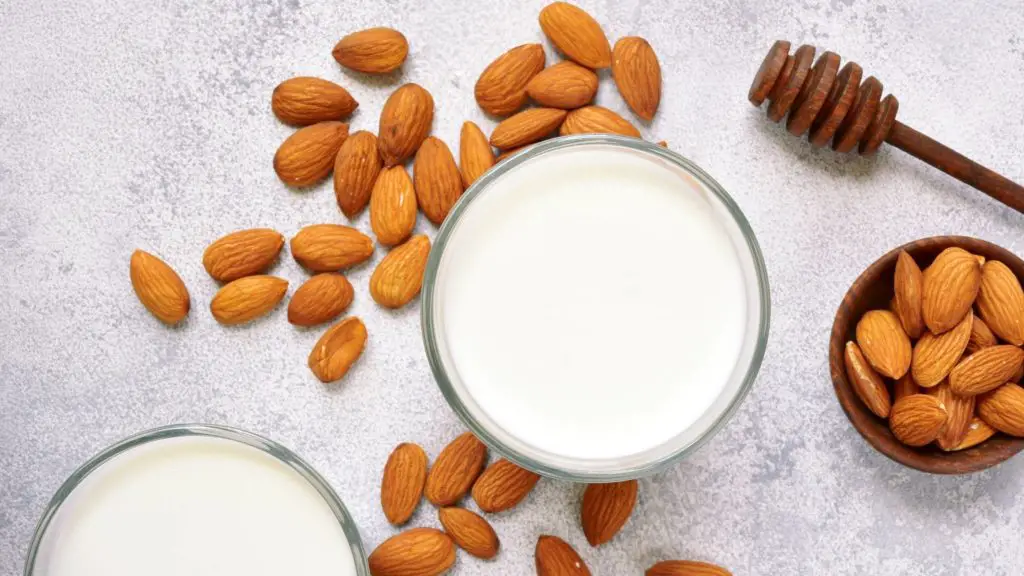Dog owners are always looking for new and healthy treats and drinks to give to their dogs. On some occasions, people can give dogs human food as a fun snack – but you need to be careful. Almond milk is a popular alternative to regular milk that many people drink, but can dogs have almond milk too? Here is a quick and informative guide to help dog owners learn if dogs can have almond milk and other non-dairy milk.
Can Dogs Have Almond Milk?
Yes, dogs can have almond milk in moderation. Almond milk is safe to give to dogs in small amounts every other week. However, dogs can only have pure, unsweetened almond milk with no other additives. Dog owners often use almond milk for dog recipes as well.
Most kinds of almond milk are safe for dogs to consume. Given that it is all-natural, it is perfectly safe to give to dogs on occasion. Usually, pure almond milk that contains 10% or more almond concentration is ideal for healthy dogs.

What Are the Benefits of Almond Milk for Dogs?
Almond milk can help strengthen a dog’s immune system. It has lots of vitamin E that removes free radicals in the dog’s body, boosting their immune systems. Plus, almond milk can help maintain a dog’s liver and eyes. A serving of almonds contains 3.5 grams of fiber, which can be good for dogs’ digestion.
Almond milk can also keep a dog’s bones and joints healthy because it has a lot of calcium. Calcium is beneficial for older dogs. Calcium is also good for big breeds with joint issues. Some other beneficial minerals almond milk contains phosphorus and magnesium, which dogs need.
What Are the Side Effects of Almond Milk for Dogs?
Almond milk in its purest form is ok for dogs in moderation. However, almond milk can be dangerous to dogs if it contains other additives. Pure almond milk that dogs can drink should only contain almonds and water. Pet owners should avoid giving almond milk to dogs containing other ingredients, even if they are natural ingredients.
For example, many commercial brands contain artificial sweeteners to make it more appealing to humans. However, artificial sweeteners can be poisonous to dogs. Artificial sweeteners like xylitol are very dangerous to dogs, even in small amounts. Xylitol can cause seizures, liver failure, and hypoglycemia in dogs.
Recommended Article: Can Dogs Eat Jelly (Jel-O or Jam)?
Other commercial almond milk can contain regular table sugar, which is bad for dogs. Dogs are smaller than humans, so even small amounts of sugar can make dogs overweight, diabetic, etc. Even natural sweeteners, like raisins, can be toxic for dogs. Therefore, dogs can only drink pure, unsweetened almond milk.
Dogs cannot drink flavored almond milk. Lots of brands have chocolate, vanilla, etc., flavors to make it tastier for humans. However, these flavorings, especially chocolate, can be toxic for dogs.

As mentioned earlier, almond milk contains minerals like calcium, phosphorus and magnesium that benefit dogs. However, these minerals are not good for dogs in excess. In fact, dogs that consume too much of these minerals can experience side effects and develop illnesses.
For instance, a dog that has too much phosphorus and calcium can develop bone issues. It is especially true for larger dogs who are still growing. Additionally, these minerals can worsen dogs’ kidney issues, and almond milk can cause kidney stones in dogs.
Excessive amounts of magnesium can negatively affect the dog’s heart and nervous system, creating symptoms like weakness. It can also lead to cardiac arrest, paralysis, coma, etc. Like phosphorus and calcium, too much magnesium can also make dogs develop kidney stones.
Can Puppies Have Almond Milk?

Ideally, puppies should not drink almond milk. Puppies will need the nutrients from their mother’s milk or puppy milk formula, and almond milk will not give puppies what they need. Almond milk will only give growing puppies empty calories, so it is not wise to give it to puppies.
Additionally, puppies are more sensitive to new foods and illnesses than adult dogs. Puppies are still developing, so it would be best to keep them on their normal diet plan.
How Much Almond Milk Can Dogs Have?
How much almond milk a dog can have will depend on its size, age and health. For instance, a healthy, medium-sized dog can have up to half a cup every other week. However, it would be best not to give dogs more than that because they will benefit more from their everyday food.
Keep in mind that almond milk is high in calories. Dogs are smaller than people, so they need fewer calories than humans, and almond milk contains 30-60 calories in one cup. If the dog weighs 10 pounds, the dog needs about 250 calories a day. One cup of almond milk will take a huge portion of their daily calorie intake, and it would contain fewer nutrients than their regular diets.
Why Can Dogs Have Almond Milk but not Regular Almonds?
The main reason dogs cannot eat almonds but can drink almond milk is that nuts are a choking hazard for dogs. Most dogs do not chew their food well, and many dogs will likely swallow their food immediately if they can. Most nuts are very small, so dogs can easily pick up a nut and swallow it without chewing.

What Other Milk Can Dogs Have?
Some dogs can have dairy milk in moderation. However, some dogs may be lactose intolerant and find it hard to digest lactose, a sugar that is in most dairy products. Dogs who are allergic to lactose or are lactose intolerant should not have dairy milk.
Pure, natural soy milk is another excellent milk alternative for dogs to drink. It must not contain any additives or flavors. Moreover, dogs can only have soy milk in moderation.
To Conclude
Almond milk can be safe for dogs to drink in moderation. Pure, unsweetened almond milk can be a nutritious snack for healthy dogs every other week.
References:
- VCA Hospitals, ‘Xylitol Toxicity in Dogs’, https://vcahospitals.com/know-your-pet/xylitol-toxicity-in-dogs, Accessed – 18 May 2021
- WebMD, ‘Slideshow: Foods Your Dog Should Never Eat’, https://pets.webmd.com/dogs/ss/slideshow-foods-your-dog-should-never-eat, Accessed – 18 May 2021

